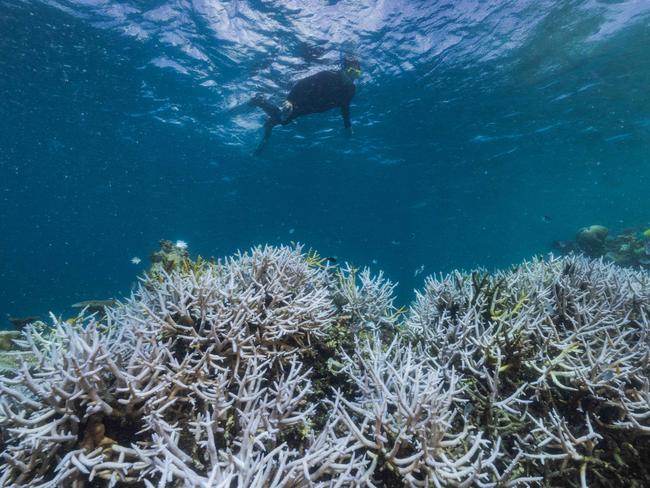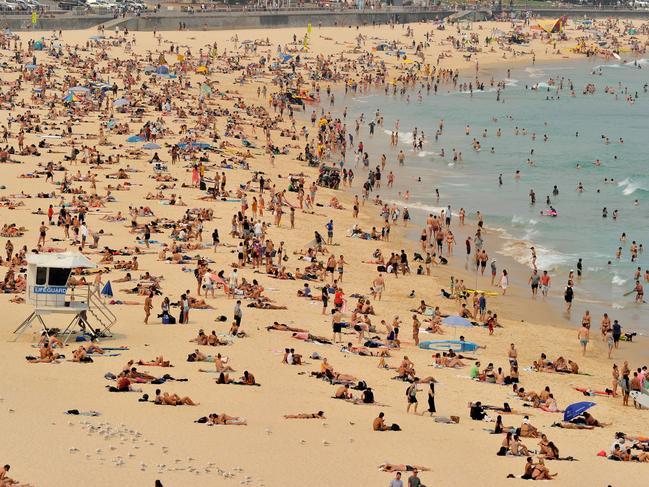Globe bakes with ‘fifth-hottest’ year on record in 2022
The year 2022 was among the hottest ever, but scientists have expressed concern about one particular climate record which got smashed for the fourth year in a row.

World
Don't miss out on the headlines from World. Followed categories will be added to My News.
Planet Earth experienced its fifth or sixth hottest year ever in 2022, while the oceans set a heat record for the fourth consecutive year, new global climate reports have found.
While southern and eastern Australia experienced a generally cool and wet 2022, the US National Oceanic and Atmospheric Administration (NOAA), NASA and the World Meteorological Organisation (WMO) all ranked the year as either the fifth or sixth warmest on record, with the variation explained by their slightly different methodologies and baseline years.
In its annual climate statement, NOAA (the equivalent of Australia’s Bureau of Meteorology) found Europe and Asia both had their second-warmest years on record, while the amount of heat stored in the top 2000 metres of the ocean hit a record high in 2022. This was on top of previous records for Global Heat Ocean Content [GHOC] set in 2021, 2020 and 2019, NOAA said.
Unlike sea surface temperature, GHOC is a measure of the water temperature to a depth of two kilometres, recorded by some 4000 autonomous floats distributed throughout the world’s oceans. The gauges take readings at various depths every 10 days.

Dr Madeleine Cahill, an oceanographer with the Australian Institute of Marine Science (AIMS), said the NOAA findings about the rise in global water temperatures were “extremely concerning” as warmer seas affected the circulation of currents, as well as sea level rise.
There was also some evidence warmer oceans could influence atmospheric circulation, she said.
Dr Cahill said Australia’s oceans were warming along with the rest of the world, with monthly water temperatures in the Great Barrier Reef above average for the past three years. Higher temperatures may have also pushed warmer waters in the East Australian Current further south, perhaps contributing to the death of kelp forests off the Tasmanian coasts, she said.
While it was a record year for global ocean temperatures, the fact 2022 was “only” the fifth or sixth warmest on record was because of the cooling effect of La Niña, the WMO said.
The WMO said the eight hottest years on record had all been since 2015.
The year 2016 remains the all-time scorcher, thanks to a massive El Nino event, followed by 2019 and 2020. The WMO said the differences in temperature between the Earth’s fourth and eighth warmest years was “relatively small”.

The WMO found the average global temperature in 2022 was about 1.14°C above pre-industrial levels recorded between 1850 and 1900 – slightly above the 1.09°C figure noted in the International Panel on Climate Change report from 2021.
Efforts to slow global warming have to date focused on limiting temperature rises to 1.5°C – a goal which many scientists say is now slipping out of reach.
La Nina conditions are expected to ease within months, potentially paving the way for an even hotter 2023.
But the temporary cooling effect of La Nina “will not reverse the long-term warming trend caused by record levels of heat-trapping greenhouse gases in our atmosphere,” WMO said in its report.
NASA scientists said global carbon dioxide emissions hit a record level in 2022, after a dip during the first years of the Covid-19 pandemic.

The NOAA pointed to Australia’s 12 “named storms” in 2022, as well as “extreme rain and flooding” in New South Wales and Victoria between late February and early May, as among the significant climate anomalies of the year.
“We faced several dramatic weather disasters which claimed far too many lives and livelihoods,” WMO chief Petteri Taalas said, pointing to floods that submerged a third of Pakistan, record-breaking heatwaves in China, Europe and the Americas and a drawn-out drought in the Horn of Africa.
“[It] will not reverse the long-term warming trend caused by record levels of heat-trapping greenhouse gases in our atmosphere,” the agency said.
More Coverage
Originally published as Globe bakes with ‘fifth-hottest’ year on record in 2022




